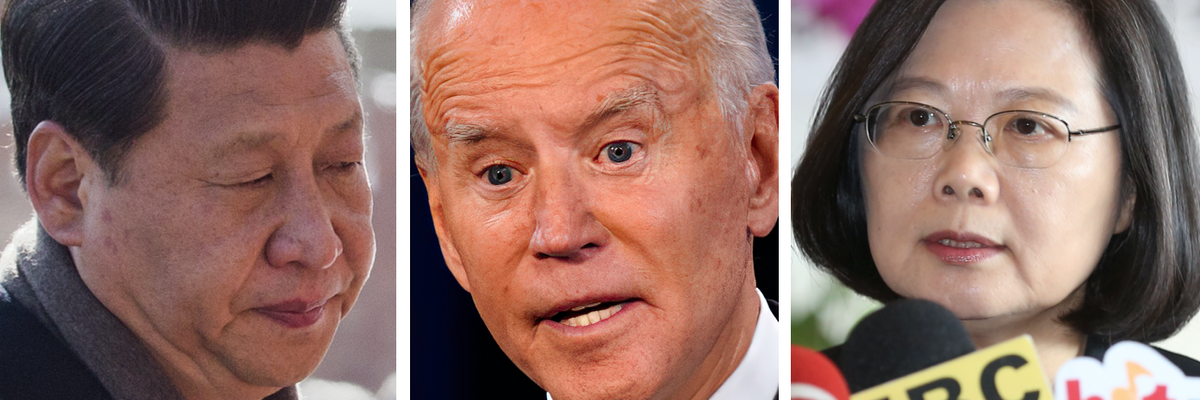The Biden administration apparently is “seriously considering” a request from Tsai Ing-wen’s administration to change the name of Taiwan’s diplomatic entity in the United States from the Taipei Economic and Cultural Representative Office (TECRO) to the Taiwan Representative Office. If that move takes place, little would change in terms of substance, but the potential symbolic impact is another matter entirely.
When the United States established formal diplomatic relations with the People’s Republic of China in 1979, it severed such ties with the Republic of China — Taiwan’s official name. Congress then passed the Taiwan Relations Act, or TRA, that created a mechanism for “unofficial” economic and cultural ties between Washington and Taipei. The Coordination Council for North American Affairs (later changed to TECRO in 1994) and a new nonprofit corporation, the American Institute in Taiwan, were promptly established in the two capitals. In reality, TECRO and AIT are de facto embassies, but their “unofficial” status and labels help maintain the fiction that Taiwan is not really a country.
In international affairs, symbols sometimes are very important, and altering them can have serious ramifications. Taiwan has existed in a diplomatic twilight zone for several decades, despite its robust economic links to major countries around the world. The restrictions that Beijing demands have caused some frustrating problems. Taiwan’s lack of formal membership in the World Health Organization, for example, impeded cooperation in combating the covid outbreak. Moreover, the PRC’s insistence on awkward terminology regarding Taiwan sometimes reaches comical levels. For example, Taiwanese athletes must compete in the Olympics and other international sporting events under the absurd “Chinese Taipei” banner. Nevertheless, the twilight zone status has helped maintain a tenuous peace between the island and mainland China. As the campaign to change TECRO’s name confirms, though, Taiwanese leaders are increasingly discontented with that arrangement.
The current pressure on Washington to make a decision comes on the heels of a brouhaha involving Taipei’s similar bid in Lithuania. In July, when Taiwan established its new diplomatic outpost in Vilnius, it was able to do so as the “Taiwanese Representative Office.” Taipei’s foreign minister, Joseph Wu, termed the move "very significant" and emphasized that "Lithuania is a good partner for Taiwan who shares the same values for freedom and democracy." He added that both countries were on the "strategic frontline of defending democratic systems."
Beijing protested Lithuania’s decision vehemently, and bilateral diplomatic tensions have continued to rise. In early August, the PRC recalled its ambassador, asserting that the Lithuanian government’s action had violated the “one China” principle. Lithuanian leaders deeply resented the PRC’s intense pressure, and on September 3, Vilnius recalled its ambassador from Beijing. Washington weighed in to support Lithuania. "We stand with our ally Lithuania and condemn the People's Republic of China's recent retaliatory actions," said U.S. State Department spokesman Ned Price. "The U.S. supports our European partners as they develop ties with Taiwan." Recently, National Security Advisor Jake Sullivan reiterated that vow of support.
PRC leaders are fully aware of how Washington’s political and military ties to Taiwan have strengthened markedly since the beginning of Donald Trump’s administration, and how Taiwan’s staunch supporters in Congress and elsewhere are pushing for even closer relations. Beijing’s suspicions likely increased again last month when President Biden equated Washington’s vague, informal commitment to Taiwan’s defense under the TRA with the explicit treaty commitments to Japan and South Korea. Biden’s comment likely was yet another clumsy misstatement from the notoriously gaffe-prone president, but Beijing may not interpret it that way. Thus, even though the issue of renaming Taipei’s office in the United States might appear to be a superficial, purely symbolic matter, the Biden administration’s decision could be very important.
Members of America’s foreign policy establishment who place a high priority on maintaining cordial U.S.-PRC relations are acutely aware of that fact, and they are urging the administration to rebuff Taipei’s bid. David Sacks, a scholar with the Council on Foreign Relations, argues: “While such a name change may sound insignificant, in reality it has important implications and should be avoided. This decision would simultaneously undermine the logic of the U.S.’s unofficial relationship with Taipei and fail to advance U.S. interests or meaningfully enhance U.S.-Taiwan ties.”
Taiwan’s American supporters also understand the larger importance of the administration’s decision. RealityChek blogger and prominent economic nationalist Alan Tonelson urges U.S. policymakers to “follow Lithuania’s lead” in dealing with China. Indeed, he argues that it’s time for “every other country that values democracy, human rights, and its own self-respect to follow Lithuania’s lead either in permitting the establishment of explicitly Taiwanese government offices on their soil, or dropping the policy or pretense that existing offices must be strictly commercial entities.”
The nature of the decision the administration ultimately makes probably depends on what signal the administration wants to send to Beijing. Refusing Taipei’s request will indicate that U.S. leaders are seeking a rapprochement with China following the contentious Trump years and the initial rather hardline policies the new administration adopted. Conversely, approving the name change will send an unmistakable signal of U.S. displeasure with Beijing’s increasingly abrasive conduct across a range of issues. In any case, the administration’s decision will reverberate throughout the U.S.-PRC relationship.
The story has been updated to reflect the date of the TECRO name change in 1994, and the correct name of the new diplomatic outpost in Lithuania.














